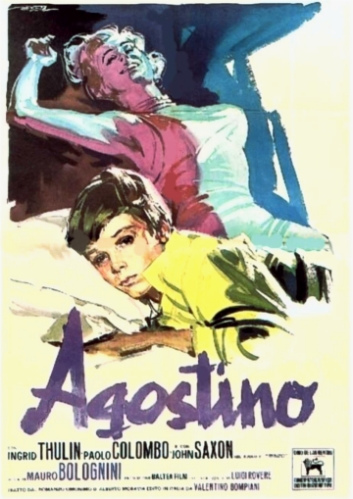
AGOSTINO
Italy, 1962, 105 minutes, Black and white.
Paolo Colombo, Ingrid Thulin, John Saxon, Mario Bartoletti.
Directed by Mauro Bolognini.
Agostino is based on a novel by celebrated Italian novelist and parliamentarian, Alberto Moravia. Moravia was a controversial author and his prolific output was the basis for quite a number of Italian films including, his most celebrated, The Conformist.
This is a film set in Venice, beautifully photographed in black and white. Ingrid Thulin, the Swedish actress present in many of Ingmar Bergman’s films including The Silence and Cries and Whispers as well as Visconti’s The Damned, is a mother who neglects her teenage son. She spends a lot of time in the company of a gigolo, played by American John Saxon.
The film treads on ambiguous ground – especially with the hindsight of later decades and issues of exploitation of teenagers, especially sexually. Agostino is by himself, neglected by his mother. He joins a gang and comes under the influence of a significant adult character – and the implications are left to the audiences’ imaginations in terms of sexual initiation, homoerotic overtones, homosexual behaviour.
The film is insightful and directed by Mauro Bolognini whose career lasted from the mid-50s to the mid-90s. He made a number of very significant Italian films and had a very profitable and well appreciated career between the mid-60s and the mid-70s including such films as Metello(*?), Bubo, Libera My Love, Drama of the Rich and Down the Ancient Staircase.
1. The appeal, interest? The focus on a boy, relationships, growing up? The Italian focus?
2. The impact of the black and white photography, widescreen, Venice and its buildings, canals and beaches? The musical background? The importance of technique in creating atmosphere by angles, slow movement of the camera etc? What sort of atmosphere was created? appropriate for the characterization and themes?
3. The initial building up of the bonds between Agostino and his mother, their being together, age differences, mutual interests, Agostino being interested in his mother's interests, the exhilaration of the joy in mutual presence? The importance of the background, wealth and status? His dead father, the importance of his mother bringing him up, an only son? The reality of the love, the intensity on the part of both, the intensity of Agostino and its potential for being disappointed? The visits to the galleries, bed, meals? His behaving as a little adult and gallant to his mother? The inevitability of break and disillusion? For the personality of the mother, her character, her hold on Agostino, their holiday together, need for him, her response to his love? her attraction for Rezzo? her need for going out with him? The innocence of the outing, swimming? The effect on her, that the didn’t notice what was happening with Agostino, her impatience? Her inability to cope? Her contribution to Agostino’s unhappiness?
4. Rezzo as an ordinary character, the attraction for the mother, his gallantry, taking them out, his not understanding Agostino, his being alert to Agostino’s moods? His inability to do anything?
5. How well delineated was the character of Agostino? The initial joy and pride with his mother? The hurt of the first visit of Razzo, and his mother’s attraction? His sulking, the outing in the boat, swimming? His refusal to cooperate? His staying at home? Silence? The effect of the experience on him?
6. The gang as an alternative? The film’s presentation of these boys and their poverty, the squalor of thhir background, the influence of Saro? Their fighting amongst themselves, their greed? Their lack of education, supervision? The emphasis on sexuality, showing Agostino the mechanics of sexuality, the homosexual overtones and undertones? Tripoli and Saro? Their experience of lift? Agostino, sharing this experience with them? His wanting to be accepted? Hostility toward Tripoli, admiration of Saro? The nature of the experiences and their effect on him, their physical violence towards him, the psychological assault especially as regards sexuality and the comments on his mother? What needs did they fulfil? his fascination and continuing to return? The incident with Tripoli, Saro an the boat and the recitation of the poems, nude swim, being attacked as a queer? The growing fright and inability to cope with these two worlds? How important was it that there was first person narrative to describe what was going on? did this contribute to our understanding of Agostino? Was it intrusive?
7. The build-up of his fear, as expressed in his dreams? the people in the dreams, the locations, the symbols? His being able to cope?
8. The comments on Agostino, his growing up, his future? insight into a society, family, relationships, education and a young boy's needs?